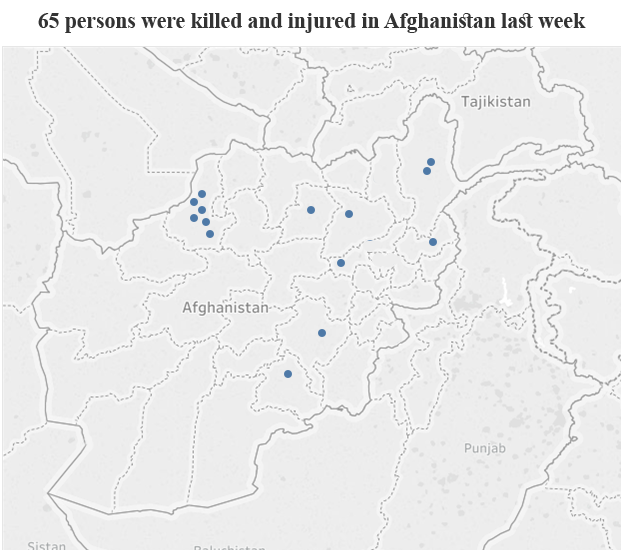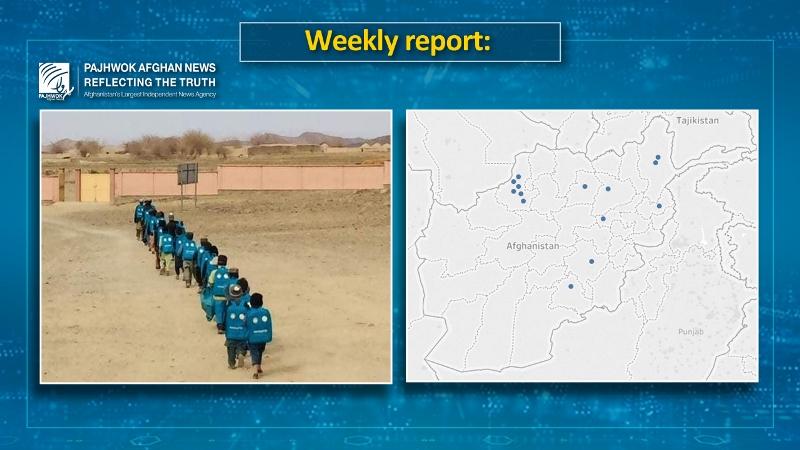KABUL (Pajhwok): The UN expressed deep concern about the Islamic Emirate’s plan to ban international organizations from providing education in the country last week, when India sent its technical team back to its embassy in Kabul and a British foundation said that in Afghanistan poppy cultivation has drastically decreased.
Last week’s major events
UN concerned at plan to ban international groups from education
West meets UK, UAE officials on issues of Afghanistan
Mujahid says West’s trips should be for cooperation with Afghanistan
New Delhi sends technical team back to Kabul embassy
China says trying to make Afghanistan stable
Blinken: Can take action against Daesh, Al-Qaeda in Afghanistan
Mujahid: Daesh defeated in Afghanistan, being destroyed
Poppy cultivation sharply declines in Afghanistan
Casualties
Last week, 30 people were killed, including a deputy governor and a former provincial police chief, and more than 35 others were injured in various incidents across the country.
A suicide car bomb killed Maulvi Nisar Ahmad Ahmadi, the deputy governor of northeastern Badakhshan province, and his driver. Six others were wounded in the attack in Faizabad.
Two days after the attack, a bomb blast targeted participants of a memorial ceremony for Ahmadi inside a mosque in Faizabad, killing 13 people, including former police chief for Baghlan province Maulvi Safiullah Samim and injuring more than 30 others.
Unidentified gunmen killed three people in Faryab, a child in Parwan, a player of the national judo team in Baghlan, a singer and his brother in Nuristan province, and the dead bodies of two women were found in Faryab province.
Local officials said an elderly man killed his son in Zabul, a man killed his wife in Faryab and another person was killed in the same province.
A young girl was killed by her father and mother in Samangan and one person was killed in a landmine blast in Ghazni.

Note: These figures are based on reports reaching Pajhwok Afghan News. Some incidents might have gone unreported or officials provided incorrect figures.
In the previous week, 15 people were killed and more than 11 were injured in various incidents across the country.
Before the regime change, hundreds of civilians, security forces and insurgents would get killed and wounded every week.
Plan to ban international organizations from education sector sparks concerns
The UN on Thursday said it was extremely concerned about the Islamic Emirate’s plan to ban international organizations from providing education in the country.
“If this would come to pass, this will be another horrendous step backward for the people of Afghanistan and especially for women and girls,” UN spokesperson Stephane Dujarric told a press conference in New York.
“Our colleagues in Kabul are speaking to the de facto authorities. We’re trying to ascertain exactly what is being planned. We have not gotten anything official.”
“Every person has a right to an education, and we want to make sure that the de facto authorities guarantee access to education for children and young adults,” he added.
On Thursday, the UN children’s agency, UNICEF, said it was following up with Afghanistan’s authorities over whether international organisations would be excluded from education projects, which could affect hundreds of thousands of students.
“UNICEF is deeply concerned by reports that over 500,000 children, including over 300,000 girls, could lose out on quality learning through community based education within a month if international non-governmental organizations working in the field of education are no longer allowed to operate,” Reuters news agency quoted UNICEF’s Afghanistan spokesperson, Samantha Mort, as saying.
International organisations, including the UN, have been heavily involved in education projects, including community-based classes, often held in homes in rural areas.
However, Islamic Emirate spokesman Zabihullah Mujahid told Pajhwok: “The Ministry of Education has information on this matter, but we have not received the information. “
According to the Ministry of Education, acting education minister Maulvi Habibullah Agha and the heads of education of 34 provinces met with Islamic Emirate supreme leader Maulvi Haibatullah Akhundzada in southern Kandahar province.
Mujahid said the Kandahar meeting emphasized on the development of education and the improvement of quality in backward areas of the country.
After the political change in the country, the Islamic Emirate suspended girls’ education above the sixth grade and then extended the ban to universities until further notice, saying the ban was not permanent and efforts being made to find a solution under slamic Sharia.
After meeting with local leaders in Kandahar last week, Norwegian Refugee Council secretary general Jan Egeland quoted the caretaker government as saying that the guidelines for education and work of women and girls were almost complete.
US special representative
US special representative for Afghanistan Thomas West travelled to the UK and the UAE and held talks with officials about Afghanistan and discussed shared interests in the country.
Zabihullah Mujahid said interfering in internal affairs of Afghanistan and using pressure tactics were not beneficial and West’s trips should about increasing cooperation with Afghanistan.
Russia insists on inclusive government in Afghanistan
Russian Foreign Minister Sergei Lavrov once again conditioned the recognition of the Islamic Emirate of Afghanistan with the establishment of an inclusive government.
He said the pledges should include serious struggle against terrorism and narcotics and the guarantee of the basic human rights of all Afghans, including the Tajiks.
But the Islamic Emirate says that its government is inclusive and respects basic human rights of Afghans based on Islamic Sharia. Officials of the Islamic Emirate say that they have met all the conditions for recognition.
India and China relations with Afghanistan
Indian External Affairs Minister S. Jaishankar has said India has sent back a technical team to its embassy in Kabul to monitor the situation and see how New Delhi can support Afghanistan’s people.
Speaking at press conference in New Delhi, Jaishankar said that right now the focus in Afghanistan was less political and more on helping the people of Afghanistan.
Similarly, Chinese Defense Minister Li Shangfu said his country would continue its efforts to end the chaos and stability in Afghanistan without interfering in the country’s internal affairs.
Concerns about ISIS and Al-Qaeda
US Secretary of State Antony Blinken has said they can take direct action against Daesh and Al-Qaeda in Afghanistan when needed.
Blinken, who met his Saudi counterpart Prince Faisal bin Farhan Al-Saud in Riyadh, said the US had demonstrated since ending America’s longest war that “we would continue to be focused on our core national security interest in preventing the resurgence of terrorism emanating from Afghanistan, and if necessary, taking action to deal with it.”
However, Zabihullah Mujahid said Daesh has been defeated in Afghanistan and was being eliminated.
He said the current security situation in Afghanistan had not been seen during the last 40 years and concerns about Daesh were an open propaganda against Afghanistan.
“We doubt that America wants to disrupt the situation in Afghanistan. This kind of propaganda is not in the interest of any side.”
Sharp decline in poppy cultivation
Annual opium cultivation has dropped by as much as 80 percent compared to last year, according to new research by David Mansfield, a leading expert on Afghanistan’s drugs trade who worked with Alcis, a British firm specializing in satellite analysis.
Mansfield said the Taliban had “exceeded expectations and reduced poppy cultivation to levels not seen since 2001.
Around 80 percent of the opium produced in Afghanistan comes from the southern province of Helmand. Mansfield said satellite imagery appeared to show that in Helmand “poppy cultivation has fallen from more than 120,000 hectares in 2022 to less than 1,000 hectares in 2023.”
ma







GET IN TOUCH
NEWSLETTER
SUGGEST A STORY
PAJHWOK MOBILE APP